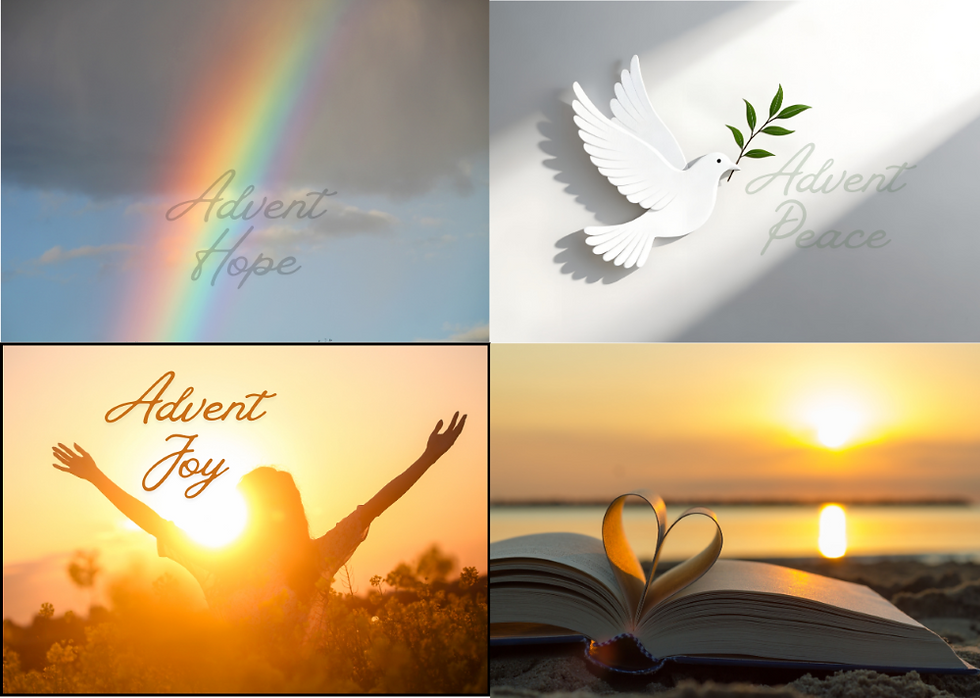Joining in with the Spirit
- Jo Allen

- Sep 5, 2024
- 4 min read
What I’ve found fascinating recently is the shift in language from the Spirit being solely with the Church, to the Spirit being in the world, and how this radically shapes our understanding of mission. I mentioned this in a previous reflection, and I will delve a little deeper into it this week.
Let me state clearly that I believe the Spirit is both in the Church and in the world - it’s not an either/or situation, and perhaps that division is unhelpful. If the Church alone has the Spirit, we are called to go and share. However, if the Spirit is already at work in the world, we are called to discern where that is and join in with what God is doing.

The first view is found throughout Scripture, especially in the Gospel of John. This view prioritises salvation through baptism in the Spirit, but if held alone it ignores the life-giving creative work of the Spirit in the world, and has also led to horrendous consequences throughout history. The second view is also present in Scripture, though more subtly than in the stark contrasts of John. One such example is in Acts 10, where the Spirit directs both Cornelius and Peter. God was at work in the Church and beyond it. Another, perhaps less subtle example, are all the references to God in creation, Psalm 104 being a good example. However, again if it is left on its own it can ignore the salvific work of the Spirit. As so often, it’s a both/and scenario. It is, however, always left to human discernment to determine what is of the Spirit and what is not, and we are not perfect at that. Both perspectives have their pitfalls, and we need to remind ourselves that, even though they are scripturally based, they are still theological ideas that will continue to develop as we discover more of God.
Recent examples of joining in with the Spirit in the world have radically shaped how we engage with mission. Take, for instance, the recent trend of Church gatherings in nature, in the wild outdoors. Many pioneers and church leaders, whether inspired or influenced by COVID, have explored finding God in the forests, fields, and waters around us. This is not a new idea - Church history is full of those who discovered God in creation - but it is one that has brought people life in recent years. However, this idea is not unique to the Church. People are seeking to connect with nature for various reasons: to get their children off screens, to address concerns about the climate crisis, to reconnect with the planet, or to learn how to grow their own food. I recently listened to a captivating podcast where Vanessa Chamberlin felt nature speaking to her, and while browsing the children’s section in a bookstore, I noticed that many titles were about the earth and saving nature. And what about goat yoga?
The Church is not alone in its thinking, and much of our new mission adventures involve being outdoors because people want to reconnect with the natural world. Is this the Spirit is speaking to us about our connection to the planet and how we can find God in creation, or is it simply humans waking up to the world we live in, how we were created to live in it, or even our guilt and repentance? Perhaps it’s all a nudge from the Spirit. The Spirit clearly works in and through the Church, and beyond it, blowing where the Spirit will. But we must be honest about our uncertainty and trust that it requires us to step out and give it a go, being willing to change direction if the wind of the Spirit blows a different way. This is a very different kind of trust in the Spirit than the one that teaches absolute certainty in our call and vision before we set out. Perhaps discovering more of the missional Spirit in this way reveals the character of the Spirit itself. This kind of following requires humility and trust, and I’m excited as we mature in our faith and have adventures of this kind with God.
So, I finish with a prayer by Thomas Morton, who capture the change in our understanding of the Spirit and mission so beautifully:
My Lord God,
I have no idea where I am going.
I do not see the road ahead of me.
I cannot know for certain where it will end.
Nor do I really know myself,
and the fact that I think I am following your will
does not mean that I am actually doing so.
But I believe that the desire to please you
does in fact please you.
And I hope I have that desire in all that I am doing.
I hope that I will never do anything apart from that desire.
And I know that if I do this you will lead me by the right road,
though I may know nothing about it.
Therefore will I trust you always though
I may seem to be lost and in the shadow of death.
I will not fear, for you are ever with me,
and you will never leave me to face my perils alone.
Amen.
Thomas Merton – thoughts in solitude
Jo Allen
Director: South West



Comments